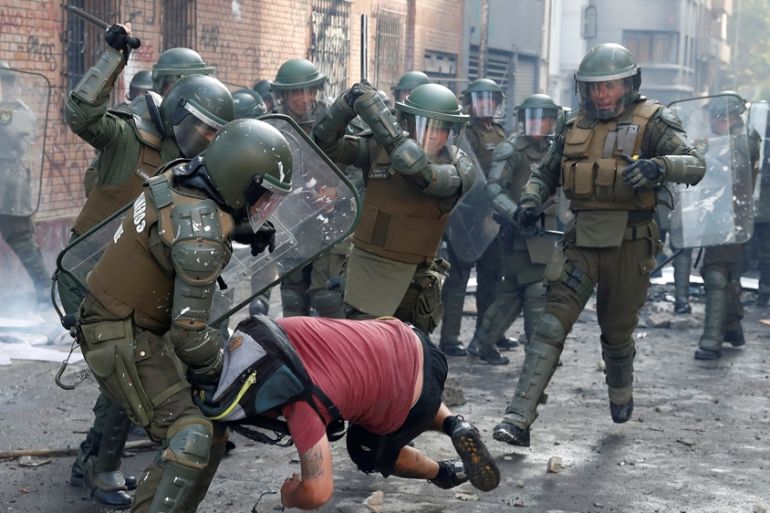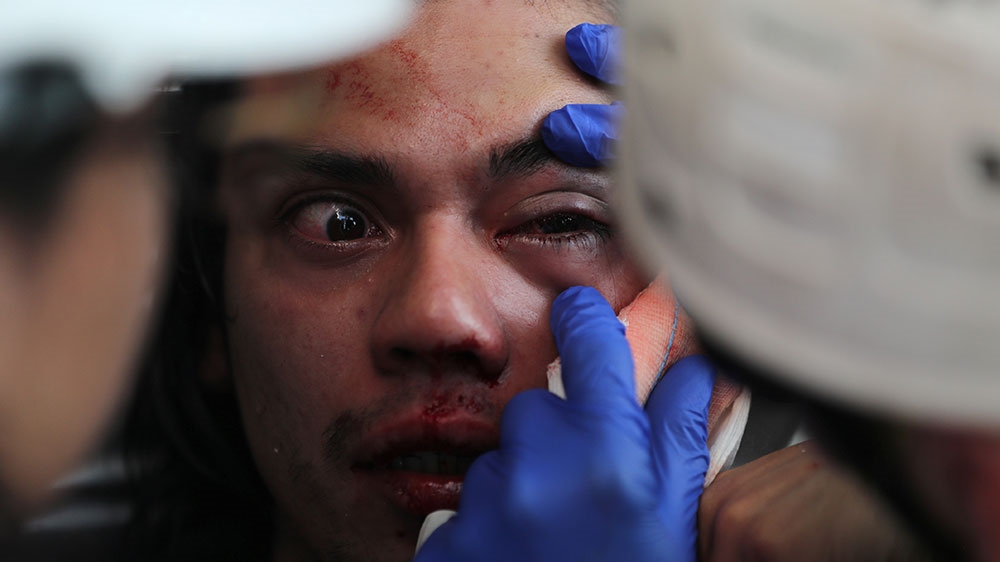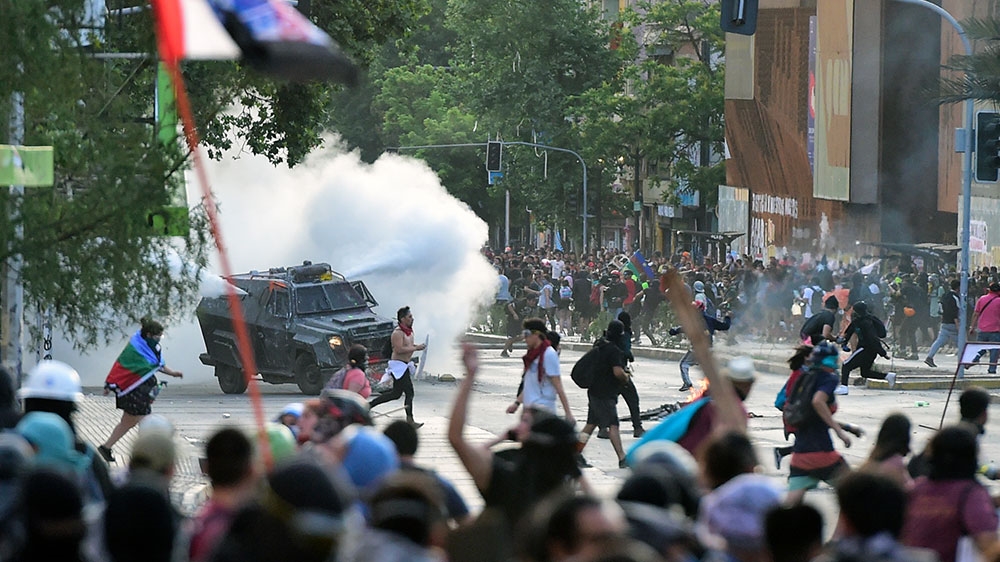HRW calls for urgent police reform in Chile to address abuses
Human Rights Watch finds Chilean police committed ‘serious human rights violations’ during weeks-long unrest.

Santiago, Chile – Chile must urgently reform its police force following grave human rights violations committed over more than five weeks of protests, Human Rights Watch (HRW) has said.
A team from the rights group had been investigating allegations of abuses during a social and political crisis engulfing the country sparked by protests over inequality and repression.
Keep reading
list of 3 itemsChile opposition files ‘constitutional accusation’ against Pinera
Chile’s Pinera vows action over security forces abuses
The announcement on Tuesday bolsters a damning report from Amnesty International released last week, that found Chilean security forces had intentionally injured protesters in order to incite fear and discourage demonstrations.
“There are hundreds of worrying complaints about excessive use of force in the streets and abuses against detainees, including brutal beatings and sexual abuse, that should be promptly and thoroughly investigated to ensure victims’ access to justice,” said Jose Miguel Vivanco, director for Americas of HRW.
HRW interviewed more than 70 people in Santiago and Valparaiso in November, including victims injured by pellets fired from shotguns or tear gas canisters at close range and victims of alleged sexual assault and torture in detention.
The team also interviewed police officers who had been injured by demonstrators, representatives of the health service, civil society, and government officials.
HRW said it found “compelling evidence” that police used excessive force to respond to protests whether they were engaged in violent actions or not.
“Issues such as the indiscriminate and improper use of riot guns and shotguns, abuse of detainees in custody, and poor internal accountability systems gave rise to serious violations of the rights of many Chileans. This is precisely why police reforms are urgently needed,” Vivanco said.

Chile’s armed police force, Carabineros, have used tear gas, water cannon and pellet firearms to disperse demonstrations, both violent and peaceful, on an almost daily basis.
According to Chile’s health ministry, emergency services treated 11,564 people injured during protests from October 18 to November 22.
HRW confirmed that police use shotguns that scatter pellets “indiscriminately” and can cause harm to anyone in their path. Ronald Barrales, for example, was taking part in a demonstration in Santiago on November 11 when people started throwing rocks at a police truck, the 36-year-old told HRW. Barrales was trying to walk past when a police officer pointed a shotgun at him from eight metres away, and hit him in the stomach, chest, and left eye with pellets. He will never recover sight in that eye.
Barrales is one of more than 220 people who have suffered a trauma to the eye.

Police had suspended the use of these shotguns when responding to protests following a report by the University of Chile’s Mechanical Engineering Faculty on November 18 that found that pellets were only 20 percent rubber, and contained 80 percent silica, barium sulphite, and lead, making them as hard as a shopping cart’s wheel.
Before the report was released, one volunteer medical responder told Al Jazeera the pellets could not be plastic or rubber as they were believed to be, because she had treated protesters with pellet wounds that had pierced the skin and even muscle.
The suspension provides an exception for use during the most extreme cases.
Reforms
HRW met with President Sebastian Pinera on Tuesday to recommend a series of reforms to improve police conduct and increase accountability. Reforms include suspending all use of pellet shotguns until a proper examination of their risks is conducted by independent authorities; reviewing police powers of detention; ensuring accountability for police abuses and misuse of less-lethal equipment.
The team also recommend police have adequate protection equipment, time off, and overtime pay. The wave of demonstrations has forced police to work up to 16 hours a day, twice the normal shift, without days off or pay for overtime. According to police officials, at least 1,896 officers have been injured in the context of the demonstrations.
Pinera has yet to respond to HRW’s report, but last week said police may have broken protocols “in some cases”.
“If those protocols were not met … that will be investigated by the prosecutor’s office and will be sanctioned by the courts of justice,” the president said.
However, the government, police and military officials categorically rejected Amnesty’s findings that police use force to “punish” protesters.

HRW’s findings come as Chileans across the country take part in a national strike on the sixth week of unrest that has paralysed the country.
Felipe Parada Mendez, an LGBTQ activist involved in the protests, told Al Jazeera that the report confirmed what they have seen in 36 days of mobilisation.
“Since the president decided to [to] bring military to the street, human rights have been systematically violated: murders; 200 people with ocular injuries, many others with balines [pellets] in their bodies. Every day we see during protests how people get hurt by Carabineros, including sexual violence and torture, proven by both reports,” Mendez said.
“It’s important that Congress takes urgent measures, they are the ones who can sanction President Pinera, they have the information and the only thing left is approved the constitutional accusation and be impeached as president,” he told Al Jazeera.